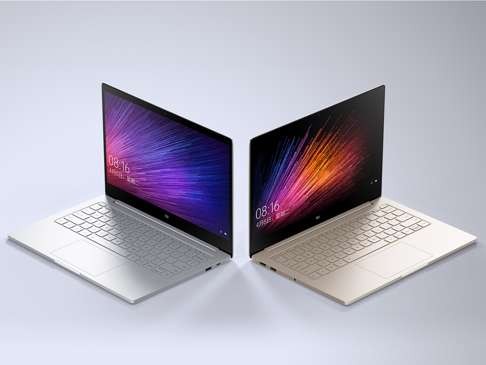Xiaomi surprises market with first laptop
Smartphone giant enters PC industry, with ultra-thin model to compete against MacBook Air

Chinese tech giant Xiaomi unveiled its first-ever laptops on Wednesday, as it seeks new sources of revenue, despite sales of PCs continuing to drop globally.
The company is calling its latest ultra-slim laptops line, the Mi Notebook Air.
In an effort to take on PC leaders such as Apple and Lenovo, Xiaomi is applying its battle-tested strategy of high-end specification and affordable pricing.
The 12.5-inch Mi Notebook Air, the smaller model, starts at 3,499 yuan, and comes complete with a 128 GB solid state drive, Intel M3 processor and 4GB RAM.
Its larger flagship 13.3-inch model is priced from 4,999 yuan, with expandable storage and an Intel i5 processor.
The company claimed both models are slimmer and lighter than Apple’s popular MacBook Air notebook, giving a clear indication of where it thinks its main competition lies.
The new laptops will run on Microsoft’s Windows 10 operating system, Xiaomi chief executive Lei Jun said at the official product launch in Beijing on Wednesday.
Sales of the laptops will begin in Xiaomi’s online stores from next Tuesday.
Lei said many of its customers had urged Xiaomi to produce laptops, even though vendors such as Apple, Lenovo, Dell and Hewlett-Packard are already clear industry leaders.
“Consumers want a high-performance laptop which is also slim and light, but there is no such product in the market,” he said, adding that the Mi Notebook Air could fill the gap.
Given the global slowdown in the PC industry, Xiaomi’s entry into the PC market comes as a surprise, according to analysts.
“[Xiaomi is] still trying to gain market share in a new segment,” Tay Xiaohan, senior market analyst for client devices at IDC, said.
“While we forecast the China PC market will decline, there will still be an increase [in growth] for ultra-slim notebooks and perhaps Xiaomi sees some opportunity in this area.”

IDC revised its forecast for the global PC market in June, estimating that shipments could decline 7.3 per cent compared with last year, approximately 2 per cent lower than it originally expected.
China’s PC shipments are expected to decline 6.6 per cent.
The research firm attributes the slowdown to a variety of factors, but primarily that consumers are turning towards alternatives such as detachable tablets as well as upgrading to newer operating systems rather than buying a new PC.
As part of an effort to tie in the laptop with Xiaomi’s expanding ecosystem of smart devices, its smartphone users are able to synchronise data from their devices to the Mi Notebook Air.
Users can also unlock their laptops with the Mi Band 2, a wearable fitness tracker the company launched earlier this year.
The dynamic smartphone landscape [in China] has shown, to even cult brands like Xiaomi, that customer loyalty is difficult to consistently maintain
Xiaomi, together with Lenovo, was pushed out of the top-5 Chinese smartphone vendors this year by lesser-known brands, Oppo and Vivo.
“The dynamic smartphone landscape [in China] has shown, to even cult brands like Xiaomi, that customer loyalty is difficult to consistently maintain,” said Melissa Chau, senior research manager with IDC’s Worldwide Quarterly Mobile Phone Tracker.
The maturing Chinese smartphone market has seen a sharp reduction in new sales, as consumers replace their devices instead with higher-end handsets.
IDC forecasts the global smartphone market to grow just 3.1 per cent this year.
At Wednesday’s launch, Xiaomi also unveiled a new handset, the Redmi Pro, which will cost upwards of 1,499 yuan.
The Redmi Pro is also the company’s first handset to come with dual-cameras, and will be available for sale from next Saturday.